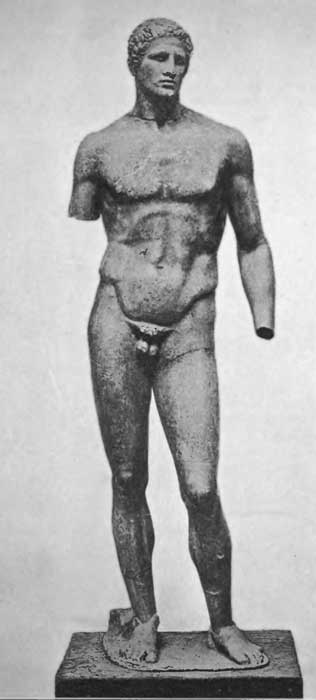|
|
Berühmte Griechische Athleten Ladas crossed the stadium length either by jumping it or on wings; his speed was demoniac, nor could it possibly be described. An epigramme about Ladas, a famous Spartan endurance runner and sprint victor.
Astylos of Crotona (Αστύλος) was famous because he was an athlete for , The Histories, Fragments of Book XXVII
Cleomedes of Astypalaea (Κλεομήδης) 492 BC. An athlete who dissapeared. A strange story about this athlete who got crazy after a decision by the chief judges of the Games. At the Festival previous to this it is said that Cleomedes of Astypalaea killed Iccus of Epidaurus during a boxing-match. On being convicted by the umpires of foul play and being deprived of the prize he became mad through grief and returned to Astypalaea. Attacking a school there of about sixty children he pulled down the pillar which held up the roof. This fell upon the children, and Cleomedes, pelted with stones by the citizens, took refuge in the sanctuary of Athena. He entered a chest standing in the sanctuary and drew down the lid. The Astypalaeans toiled in vain in their attempts to open the chest. At last, however, they broke open the boards of the chest, but found no Cleomedes, either alive or dead. So they sent envoys to Delphi to ask what had happened to Cleomedes. The response given by the Pythian priestess was, they say, as follows: Last of heroes is Cleomedes of Astypalaea; Honour him with sacrifices as being no longer a mortal. So from this time have the Astypalaeans paid honours to Cleomedes as to a hero. The boxer Melankomas of ,
A famous “athlete” was Nero, the Emperor of Rome, 6 “victories”. In around 67 AD he was accompanied by 5000 Romans who were paid to applaud him. Although he felt from his chariot during the race and could not finish he was declared a winner. The Games had to start 2 years earlier because Nero required this. His trip: September 66 Nero left for Greece, Performances at Olympic, Isthmian, Nemean and Pythian Games. November 67 Freedom of the Greeks declared at Isthmian Games. Early in 68 Nero returned to Italy, and committed suicide later that year. The Greeks (especially from Elis) considered the Olympic Games with Nero as a “non-Olympiad” like the three Games that were held by the people of Pisa.. In a Pancration event in Nemea in 400 BC Creugas (or Kreugas) of Epidamnos and Damoxenos of Syracuse struggle for hours without a decision. Creugas and Damoxenos agreed that each would accept an undefended blow. Creugas delivered first a punch to his opponent's head. Still standing, Damoxenos jabbed Creugas with his fingers straight out, piercing his rib cage. Damoxenos yanked out his intestines, killing him on the spot. Damoxenos was expelled, although seemingly on a technicality: The judges deemed the disemboweling to be several blows (one for each finger) instead of the single agreed-upon blow. (Info from Betsy Carpenter : The First Olympics , U.S. News 1/8/04.) Antonio Canova prooduced the sculptures of "Creugas and Damoxenos", in the Gabinetto Canova of the Vatican Gallery. Sostratus of Zopyrus of Athens victory in Pankration (385 AD?) one if not the last known athletes (after a discovery of a new list with the names of 20 athletes in 2001 in Olympia that extends the previously known list of athletes from 277 AD now to to 385 AD. (other sources say that the last athlete known was Varazdates from Armenia in 385 AD) The first winners in athletic events Stadion (στάδιο) since 776 BC, first winner Coroebus of Elis. LINKS , Yale University Press , ISBN 0300100833
 |
|
|||||||||||||||||
